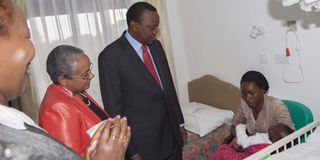MUTIGA: Ethnic nationalism will ruin Uhuru’s legacy just as it tarnished Kibaki’s image

President Uhuru Kenyatta and the First Lady Margaret Kenyatta after opening the Manu Chandaria Medical Centre at Gertrude’s Children’s Hospital, November 1, 2013. The President has admitted that the government has not done enough to reduce road accidents.
What you need to know:
- One would expect him to be Kibaki 2.0, to use the language of the technology companies which shrewdly keep modifying and slightly upgrading their products to boost sales.
- By 2007 in Kenya, the percentage of donor support for the recurrent budget (the money needed to keep the state afloat, pay the salaries of teachers, nurses and policemen) had fallen to five per cent.
- To give him his due, Mr Kenyatta has done a few things right. He fully implemented the MoU between him and William Ruto’s URP, eluding the sort of crisis Mr Kibaki courted by dumping Mr Raila Odinga in 2003.
As a self-declared digital President, one would expect the Twitter-using, Facebook-surfing Uhuru Kenyatta to be an improvement on his predecessors.
One would expect him to be Kibaki 2.0, to use the language of the technology companies which shrewdly keep modifying and slightly upgrading their products to boost sales.
Unfortunately, Mr Kenyatta is very similar to Mr Kibaki in one important respect. He is in the habit of making key appointments from his own ethnic community.
If he does not change course, he will have the same image problem that ruined Mr Kibaki’s legacy.
ETHNICITY STILL SALIENT
In a country where ethnicity is so salient, it is obviously unwise to allow the perception to set in that your own group is getting a bigger share of the national cake than everyone else.
There is no excuse for it. The claims that people are appointed on merit amount to hogwash which even the people advancing the argument do not themselves believe.
There are professionals from all over the country who can do some of the jobs to which the President has made appointments recently.
Mr Kenyatta should log on to Facebook and see the reaction when he announces that yet another Kikuyu has taken up a new post. Cries of exclusion follow with disappointment being expressed even by his own supporters.
A clever wag recently changed the tag that united the nation post-Westgate from “We are One” to “We are Onedering”.
Mr Kenyatta should know better because he had a ringside view of the Kibaki presidency. By any standards, Mr Kibaki was a reasonably successful president.
Today, Uhuru is able to go toe to toe with the West largely because the percentage of public expenditure drawn from foreign aid went down sharply in the Kibaki years.
In Uganda and Tanzania, foreign aid accounts for about 40 per cent of their budgets.
DONOR SUPPORT
By 2007 in Kenya, the percentage of donor support for the recurrent budget (the money needed to keep the state afloat, pay the salaries of teachers, nurses and policemen) had fallen to five per cent.
Yet Mr Kibaki is viewed negatively in many parts of the country because he is seen as having taken what was a major Kenyan success – the defeat of Kanu in 2002 – and turned it into a Mt Kenya affair.
The appointments in his first two or three years in office when he disproportionately favoured the Kikuyu and Meru made his presidency unnecessarily turbulent and laid the ground for the defeat of the government in 2005 in the referendum (a contest that had almost nothing to do with the constitution) and his narrow escape from being a one-term president in 2007.
As it is, instead of being feted as a national hero, the most fulsome praise for Mr Kibaki has come from non-Kenyans who are not implicated in our ethnic politics, commentators like Charles Onyango-Obbo who noted in a blog post that Mr Kibaki spent more on infrastructure in 10 years than his two predecessors did in 40 years.
To give him his due, Mr Kenyatta has done a few things right. He fully implemented the MoU between him and William Ruto’s URP, eluding the sort of crisis Mr Kibaki courted by dumping Mr Raila Odinga in 2003.
For the first time since the Kibaki years, also, the offices of Internal Security and Finance minister are held by people who are not from the mountain.
An enlightened leader would seek to build on that base and expand his support beyond the Mt Kenya and Kamatusa groups that delivered nearly 90 per cent of his support at the last election.
There will be no outcry among the Kikuyu if they do not land every top public sector job that falls vacant.
By taking up the worst habits of Mr Kibaki and making appointments that suggest a pattern of exclusion, Mr Kenyatta is making life unnecessarily difficult for himself.
Such decisions not only mean he will face a tough re-election fight, but that when he exits State House, he will be viewed in large parts of the country not as a Kenyan but as a Mt Kenya nationalist. That is a fate he can easily avoid.
Murithi Mutiga, an editor with the Sunday Nation, is a Chevening Scholar at the London School of Economics. [email protected]





